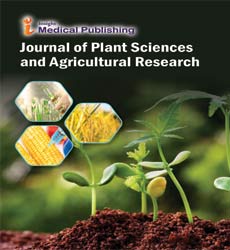Plant Synthetic Biology for Environmental Applications
Colin Ruprecht*
Department of Plant Science, University of Bonn, Bonn, Germany
- *Corresponding Author:
- Colin Ruprecht
Department of Plant Science, University of Bonn, Bonn,
Germany,
E-mail: ruprecht_c@gmail.com
Received date: May 13, 2024, Manuscript No. IPJPSAR-24-19078; Editor assigned date: May 15, 2024, PreQC No. IPJPSAR-24-19078 (PQ); Reviewed date: May 29, 2024, QC No. IPJPSAR-24-19078; Revised date: June 06, 2024, Manuscript No. IPJPSAR-24-19078 (R); Published date: June 12, 2024, DOI: 10.36648/ipjpsar.8.2.140
Citation: Ruprecht C (2024) Plant Synthetic Biology for Environmental Applications. J Plant Sci Agri Res Vol.8 No.2: 140.
Description
Plant synthetic biology is an interdisciplinary field that merges principles of biology, genetics, engineering and computer science to redesign and engineer plants for various purposes. It involves the manipulation of plant genomes and metabolic pathways to create novel traits, improve crop yields, enhance disease resistance and even produce valuable compounds. This emerging field holds significant promise for addressing global challenges such as food security, climate change and sustainable agriculture. At the heart of plant synthetic biology lies the ability to precisely edit the genetic code of plants. Techniques such as CRISPR-Cas9 have revolutionized genome editing, allowing researchers to make targeted modifications to plant DNA with unprecedented accuracy and efficiency. By introducing or removing specific genes, scientists can alter traits such as growth rate, nutrient uptake and response to environmental stresses. One of the primary goals of plant synthetic biology is to enhance crop productivity and resilience in the face of changing environmental conditions. Climate change, coupled with a growing global population, poses a significant threat to food security. Through genetic engineering, scientists can develop crops that are better adapted to drought, heat, pests, and diseases. For example, researchers have engineered droughttolerant crops by manipulating genes involved in water conservation and stress response pathways. Similarly, genetic modification has been used to enhance pest resistance in crops, reducing the need for chemical pesticides and promoting environmentally sustainable agriculture practices.
Synthetic biology
Another application of plant synthetic biology is the production of valuable compounds through metabolic engineering. Plants possess a vast array of biochemical pathways that can be harnessed to produce pharmaceuticals, biofuels and other highvalue chemicals. By reprogramming these pathways, researchers can transform plants into biofactories capable of synthesizing complex molecules. For instance, genetically modified tobacco plants have been engineered to produce therapeutic proteins, including vaccines and antibodies, at a fraction of the cost of traditional manufacturing methods. Similarly, metabolic engineering has been used to increase the yield of biofuel precursors in crops such as switch grass and sugarcane, offering a renewable alternative to fossil fuels. Beyond agriculture and biotechnology, plant synthetic biology also holds promise for environmental remediation and ecosystem restoration. Plants play a vital role in carbon sequestration and soil remediation, and engineered plants could potentially enhance these processes. For example, scientists are exploring ways to engineer plants with enhanced carbon capture and storage capabilities to mitigate climate change. Additionally, genetically modified plants could be used to remediate contaminated soils by absorbing and detoxifying pollutants such as heavy metals and organic chemicals. Despite its immense potential, plant synthetic biology also raises ethical, social and regulatory concerns. The release of Genetically Modified Organisms (GMOs) into the environment poses risks such as unintended ecological consequences and gene flow to wild populations. Moreover, there are concerns about the potential for corporate control of agricultural systems and the impact of genetically modified crops on traditional farming practices and biodiversity. In conclusion, plant synthetic biology offers a powerful toolkit for addressing pressing challenges in agriculture, biotechnology, and environmental sustainability. By harnessing the genetic diversity of plants and leveraging cutting-edge technologies, researchers can engineer novel traits, develop sustainable crop varieties and create biobased solutions to complex problems. However, the responsible development and deployment of genetically modified plants require careful consideration of ethical, environmental, and regulatory issues to ensure the safe and beneficial use of this technology.
Open Access Journals
- Aquaculture & Veterinary Science
- Chemistry & Chemical Sciences
- Clinical Sciences
- Engineering
- General Science
- Genetics & Molecular Biology
- Health Care & Nursing
- Immunology & Microbiology
- Materials Science
- Mathematics & Physics
- Medical Sciences
- Neurology & Psychiatry
- Oncology & Cancer Science
- Pharmaceutical Sciences
